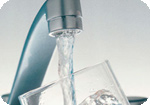| Thursday, 15 May 2025 Home • About Us • Contact Us |
|
|
|
You are here:
Water is a basic nutrient that is critical for the human body. It supports the digestion of food, absorption, transportation and use of nutrients, and elimination of toxins and wastes from the body.
Not only is it our most important nutrient but it is also by far the most abundant in our bodies - about two-thirds of the body is water. The brain is about 85 percent water, whereas muscles are 75 percent, and bone is 22 percent. Therefore making sure you are sufficiently hydrated is the one of the best ways to preserve and improve health. Are You Drinking Enough? Apart from feeling thirsty, there are many ways the body tells you that you need to take in more fluid. Here are a few signs of dehydration:
The more long-term consequences of not drinking enough water include the increased risk of kidney stones, premature aging, high blood pressure, digestive problems, certain cancers, depression and cognitive decline. Apart from kidney stones, these conditions are not solely caused by a lack of water, but not drinking enough makes them worse. This is because just about every biochemical reaction in the body depends on water. How Much water Do You Need? The amount of water required varies from person to person, depending on age, diet and lifestyle. On average, you should aim for about eight glasses of water-based liquid a day. We get about 19 percent of our requirement from the food we eat, with fresh fruit and vegetables containing the most. So the more fruit and vegetables you eat the more water you take in. On the other hand, concentrated foods with a high sugar or protein content increase the need for water to dilute the excess sugars or break down the products for absorption into the bloodstream. Research has found that the body retains much more water if you drink little and often, rather than having it all in one go. Also, if water is drunk with sugar, which is often the case in sugary drinks, the water is less well retained by the body. Tips to Drink More water
Link to this article: Show: HTML Link • Full Link • Short Link
Related Articles:
You must be registered and logged in to comment. |
|
 |
 | |
|
|








